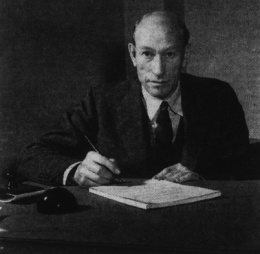John H. Provinse
| Name | John H. Provinse |
|---|---|
| Born | January 20 1897 |
| Died | January 22 1965 |
| Birth Location | Montana |
Applied anthropologist and head of the Community Management Division of the War Relocation Authority (WRA). One of the first staffers hired by the WRA, John H. Provinse (1897–1965) helped shape the WRA's core approach and managed one of its most important units for nearly the entire life of the WRA.
Provinse was born in Carbon County, Montana, as one of eight children of Henry C. and Martha A. Province. After a three-year stint in the navy served mostly in the Philippines beginning in 1917, he entered the University of Chicago, graduating with a law degree in 1925. After working briefly for a Chicago law firm, he switched to anthropology, reentering the University of Chicago. After marrying Helen Tanner in 1927, he did fieldwork in Borneo among the Dayak people and completed his master's degree in 1930. He took an assistant professor position at the University of Arizona in 1932 and completed his doctoral dissertation on Plains Indians culture under the direction of A. R. Radcliffe-Brown in 1934. Frustrated with the classroom and wanting to do work that had a more direct impact, he left Arizona in 1936 to take a position with the United States Soil Conservation Service, where he was assigned to work on the Navajo Reservation. In 1940, he moved to a post in the Division of Farm Population and Rural Welfare, Bureau of Agricultural Economics in the U.S. Department of Agriculture. [1]
Soon after the WRA formed in the spring of 1942, director Milton Eisenhower hired Provinse to head the Community Management Division. Working out of the WRA's Washington, DC, office, Provinse's duties included overseeing such core functions as education, health care, internal security, and community enterprise. WRA (and University of Arizona) colleague Edward Spicer credits Provinse as being one of the main architects of the WRA's "value principals" (along with director Dillon Myer and solicitor Philip Glick). The first social scientist hired by the WRA, Provinse was a key figure in forming and overseeing the Community Analysis Section , which eventually placed social scientists in each of the concentration camps. Provinse also set up a Community Government Section, which encouraged inmate "self-government," tabbing former colleague Solon Kimball (they had worked together on the Navajo Reservation) to head it. Provinse remained with the WRA through nearly its entire life, leaving in February 1946. While working for the WRA, Provinse also served as the president of the Society for Applied Anthropology from 1943 to 1946. [2]
After the war, Provinse held a variety of mostly nonacademic positions, including six years as an assistant commissioner of Indian affairs right after the war, a State Department post in the Asia Development Services (1952–53), a director of the Social Research Center at American University in Cairo (1953–58), and an associate in community development for the Philippines for the Council on Economic and Cultural Affairs (1959–63). Spicer characterized his career as being "devoted primarily to bringing anthropology to bear on practical human problems." He died of coronary thrombosis at age 68 on January 22, 1965. [3]
For More Information
" Meet the WRA: John Province Directs WRA Community Management. " Pacific Citizen , Jan. 4, 1943, 6.
Provinse, John H., and Solon T. Kimball. "Building New Communities during War Time." American Sociological Review 11.4 (Aug. 1946): 396–409. [Consists of separate papers by the two former colleagues presented at the American Sociological Society meeting, March 1–3, 1946. Provinse's section, titled "The Influence of External Factors on the Development of Evacuee Communities," looks at selected factors that he felt greatly influenced what happened in the camps, including the establishment of the artificially low $19/16/12 wage scale, security policy more attuned to public relations that actual need, the banning of outside religious workers from living in the camps, and the general impact of outside pressure groups.
Spicer, Edward H. "John H. Provinse 1897–1965." American Anthropologist New Series 68.4 (Aug. 1966): 990–94.
———. "Anthropologists and the War Relocation Authority." In The Uses of Anthropology . Edited by Walter Goldschmidt. Washington, D.C.: American Anthropological Association, 1979. 217-37.
"WRA Community Management Head J. Provinse, Dies," Pacific Citizen , Jan. 29, 1965, 3.
Footnotes
- ↑ "Meet the WRA: John Province Directs WRA Community Management," Pacific Citizen , Feb. 4, 1943, 6, accessed on Jan. 12, 2018 at: http://ddr.densho.org/ddr-pc-15-5/ ; Edward H. Spicer, "John H. Provinse 1897–1965," American Anthropologist New Series 68.4 (Aug. 1966), 990–91.
- ↑ "Meet the WRA"; Spicer, "John H. Provinse"; Edward H Spicer, "Anthropologists and the War Relocation Authority" in The Uses of Anthropology , edited by Walter Goldschmidt (Washington, D.C.: American Anthropological Association, 1979), 222–23, 230–31; John Kitasako, "Washington News-Letter," Pacific Citizen , Feb. 16, 1946, 2, accessed on Jan. 12, 2018 at http://ddr.densho.org/ddr-pc-18-7/ ; David H. Price, Anthropological Intelligence: The Deployment and Neglect of American Anthropology in the Second World War (Durham, N.C.: Duke University Press, 2008), 287n21
- ↑ Spicer, "John H. Provinse"; "WRA Community Management Head J. Provinse, Dies," Pacific Citizen , Jan. 29, 1965, 3.
Last updated Feb. 1, 2024, 10:03 p.m..

 Media
Media